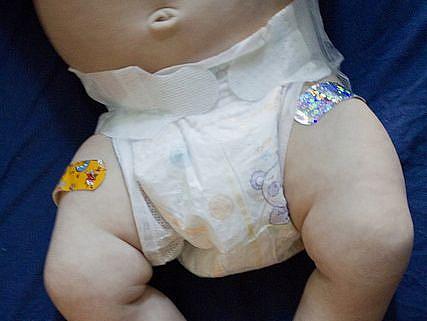Why did CNN give Donald Trump a platform to spread vaccine misinformation?

After Wednesday night’s GOP debate at the Ronald Reagan Presidential Library in Simi Valley, California, social media and the news buzzed about Donald Trump, Ben Carson, vaccines and autism. It began when moderator Jake Tapper of CNN raised Trump’s repeated linkage of childhood vaccines to autism and posed this question to Carson: “Should Trump should stop saying this?”
Carson, a pediatric neurosurgeon, in no uncertain terms, concurred with the medical establishment that children do not become autistic after getting vaccinated. He asserted that “vaccines are important” and then began to part ways with many of his fellow doctors. Some vaccines -- the ones that don’t prevent diseases that causes “death or crippling” -- should be given with discretion, he said.
Carson questioned whether children get too many vaccines in a short period of time: “A lot of pediatricians now recognize that and are cutting down on the number and proximity in which those are done,” he said before segueing into a point about “big government” pushing vaccines and the fact that some people bristle at government intrusion into their lives. Perhaps this is a surprising response from a M.D., and his colleagues were certainly disappointed, but it is not surprising coming from someone who champions personal liberty and limited government.
Trump responded that autism “has gotten totally out of control” and called for vaccines to be in smaller doses and spaced out more, citing his children as an example. “I had my children taken care of over a long period of time, over a two or three year period of time,” he said. Apparently, Trump figured out how to fight autism even before its dramatic rise, given that his oldest child is in his late 30s.
Nonetheless, Trump would do well to actually look at the CDC’s vaccine schedule, which organizes vaccines just as he suggests -- a two year period for most of the recommended vaccines, and even longer for others. Trump might also examine the schedule before repeating the story of an employee’s two or two-and-a half year old who got a vaccine, came down as “very, very sick,” had a fever, “and now is autistic.” There is no childhood vaccine recommended between ages two to three, save the influenza vaccine that is advised for almost everyone. The two to three year age range does fall into the “catch-up” category, which would include parents who chose to space out the vaccines beyond the recommended schedule. I have no idea what this family’s real story is, but certainly the way Trump recounted it leaves questions unanswered.
The real whopper was Trump’s assertion that his alternative vaccination schedule and dosing will have “a big impact on autism.” While he insisted that “all I am saying” is to space vaccines out, Trump said much more by taking a step further away from the evidence, suggesting that spacing them out and reducing the dose will make autism rates plummet.
I suppose in some people’s minds, like CNN and reality TV fans, this makes for good watching. From the start, Tapper tilted the debate in a “he said, she said” direction that fomented disputes rather than actual policy discussion. I suspect Ohio Gov. John Kasich had it right that people at home probably wanted turn off the debate because of the grade school-level back and forth that focused on getting candidates to fight with Trump.
With the science now settled -- vaccines do not cause autism -- it seems irresponsible that CNN gave Trump a platform for spreading scary and wrong information about vaccines. There’s already enough of that still going on. A better course of questioning from the CNN moderators would have focused on a more pressing issue, and one very recently in California news -- mandatory vaccines. The state has enacted one of the toughest mandatory vaccination laws in the U.S.
Former Hewlett-Packard CEO Carly Fiorina waded into the debate a couple months ago by voicing her support of parents being able to decide when and if their children get vaccinated. Earlier this year, New Jersey Gov. Chris Christie and Kentucky Sen. Rand Paul caught flack for their comments about vaccine choice. Paul, an ophthalmologist, did get the opportunity during the debate to weigh in with a “second opinion,” where he defended his stance on letting parents decide what vaccines their children get.
While Paul conceded during the debate that “science says bunching them [the vaccines] up isn’t a problem,” he continued that he “ought to have the right to spread my vaccines out a little bit.”
At least four of the candidates on stage supported some form of parental choice regarding their children, which seems to be partly based on thinking that so many vaccines at once might not be safe. A far more thoughtful and helpful discussion would have been about how they propose balancing individual choice with public health. The debate is over and done, but journalists can certainly follow-up with their reporting. Here are some proposed questions/story ideas:
1) Why do you think the current vaccine schedule might not be safe?
2) What makes you think spacing out vaccines might be any safer?
3) Has there been rigorous scientific study of any “alternative” vaccine schedules?
4) What sources do you recommend for helping parents make vaccine decisions?
5) Are there vaccines you think parents should be able to forgo completely?
6) How do you propose balancing parental choice with protecting the public’s health, especially in the even of an outbreak?
7) How much of a role does mistrust of government and other institutions play in your support of parental choice?
Getting answers to questions such as these can move the discussion forward and help get parents on board with protecting their kids through vaccination.
[Image from Quinn Dombrowsky via Flickr]

